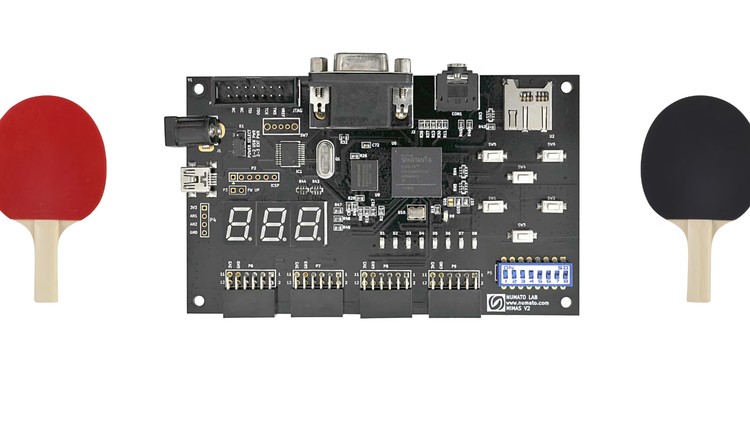
Design a system with VHDL, simulate, synthesize and test on FPGA
What you will learn
Basic Concepts of Digital Circuits: processes, registers, counters, if-then-else statements, concurrent statements, combinational and sequential circuits, …
Debounce on a Pushbutton
7-Segments Display
Writing and Understanding VHDL Code
Simulation of HDL Designs: understanding how to read waveforms and how to associate it to the VHDL code
Testing a Design on FPGA
Analyzing a Problem and Thinking like a Hardware Engineer
Synthesizing a Design on FPGA
Using a Constraints File
Why take this course?
🎓 Course Title: Learn FPGA Design by Practice: Ping Pong Game
📘 Course Headline: Design a System with VHDL, Simulate, Synthesize and Test on FPGA
Unlock the Secrets of Hardware Engineering!
Welcome to a hands-on journey into the fascinating world of Field Programmable Gate Arrays (FPGAs) and digital circuit design. This course is not just about learning – it’s about doing. With a focus on practical application, you will transform theoretical knowledge into tangible skills by designing a Ping Pong game from scratch using VHDL.
Why Enroll?
- 🧠 Master VHDL: Understand the core concepts and coding rules of VHDL – the hardware description language that’s indispensable for FPGA design.
- 🚀 Practical Skills: Learn to create digital circuits with real-world applications by following a structured, project-based learning approach.
- 💻 Design & Implementation: Gain insights into the process of converting design requirements into efficient hardware solutions that can be implemented and tested on an FPGA development board.
- 🔬 Simulation & Verification: Master the art of simulating and synthesizing your designs, ensuring they function as intended before you commit them to hardware.
- ✅ Comprehensive Testing: Learn to test your designs thoroughly to ensure they are bug-free and meet all specifications.
What Will You Achieve?
By the end of this course, you will be equipped with a robust skill set that includes:
- 🎩 Understanding FPGA architecture and how VHDL is used to program them.
- ✅ Writing, simulating, synthesizing, and testing HDL (Hardware Description Language) code.
- 🛠️ Utilizing constraints files for optimization and efficient resource utilization.
- 🤖 Developing a complete Ping Pong game on an FPGA, from basic to advanced functionalities.
- 🧩 Applying debugging techniques to troubleshoot and optimize your designs.
Course Breakdown:
- Basic Concepts of Digital Circuits: Dive into the fundamental principles that govern digital circuit design.
- VHDL Coding Rules and Syntax: Learn the syntax and structure of VHDL to effectively code FPGA designs.
- HDL Simulation: Explore different simulation techniques and tools, learning how to simulate your VHDL designs step by step.
- Synthesis Process: Understand how to convert your HDL design into a physical representation on an FPGA.
- Testing & Debugging: Discover methods to test your hardware design against its specifications, and learn how to debug and fix issues efficiently.
The Ping Pong Game Project:
Throughout this course, you will be working on a project that will bring all the concepts together: designing a Ping Pong game for FPGA. This hands-on experience will allow you to apply everything you’ve learned in a practical setting. You’ll use two push buttons for serving and returning the ball, eight LEDs to represent the ball’s movement, and develop a scoring system that responds to player actions. The game will challenge players with increasing ball speeds and reward them for quick reflexes and strategic thinking.
Embark on this exciting learning adventure and emerge as an FPGA design professional ready to take on complex challenges and create innovative hardware solutions. Let’s start your journey to mastering FPGA design by turning the concept of a Ping Pong game into a reality! 🏓🚀
Enroll now and take the first step towards becoming an FPGA design expert! 🎉